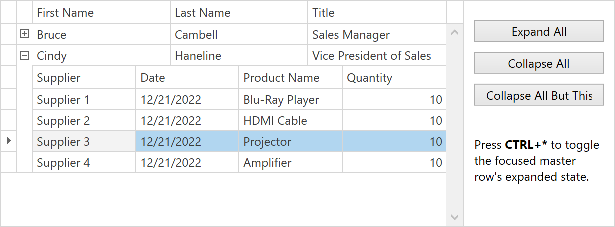GridControl.CollapseMasterRow(Int32, DetailDescriptorBase) Method
Collapses the detail section for the specified row.
Namespace: DevExpress.Xpf.Grid
Assembly: DevExpress.Xpf.Grid.v24.2.dll
NuGet Package: DevExpress.Wpf.Grid.Core
#Declaration
public void CollapseMasterRow(
int rowHandle,
DetailDescriptorBase descriptor = null
)#Parameters
| Name | Type | Description |
|---|---|---|
| row |
Int32 | An integer value identifying the row by its handle. |
#Optional Parameters
| Name | Type | Default | Description |
|---|---|---|---|
| descriptor | Detail |
null | A Detail |
#Remarks
This method can be used when implementing custom controls that control Detail section visibility. In this case, you might want to hide default expand buttons by disabling the TableView.ShowDetailButtons option.
This method may have no effect if overridden in the GridControl.MasterRowCollapsing event handler.
To determine the expanded state of master rows and Detail visibility, use the GridControl.IsMasterRowExpanded, GridControl.GetVisibleDetail and GridControl.GetVisibleDetailDescriptor methods.
#Example
This example demonstrates how to expand and collapse the GridControl‘s master rows in code. The example contains the following buttons:
- The Expand All button expands all master rows.
- The Collapse All button collapses all master rows.
- The Collapse All But This button collapses all master rows except for the focused row / row with the focused detail.
The CTRL+* shortcut is bound to toggle the focused master row’s expanded state.

The following table lists members used in this example:
| Member | Description |
|---|---|
Grid |
Collapses the detail section for the specified row. |
| Grid |
Expands the specified master row and, optionally, shows the specified Detail. |
| Grid |
Determines the specified master row’s expanded state and, optionally, the specified Detail’s visibility. |
| Grid |
Changes the expanded state for a specified master row and, optionally, shows a specified Detail. |
<dxg:GridControl x:Name="grid" AutoGenerateColumns="AddNew" Grid.Column="0">
<dxg:GridControl.View>
<dxg:TableView x:Name="view" AutoWidth="True" ShowGroupPanel="False" PreviewKeyDown="TableView_KeyDown"/>
</dxg:GridControl.View>
<dxg:GridControl.DetailDescriptor>
<dxg:DataControlDetailDescriptor ItemsSourcePath="Orders">
<dxg:DataControlDetailDescriptor.DataControl>
<dxg:GridControl AutoGenerateColumns="AddNew">
<dxg:GridControl.View>
<dxg:TableView AutoWidth="True" ShowGroupPanel="False"/>
</dxg:GridControl.View>
</dxg:GridControl>
</dxg:DataControlDetailDescriptor.DataControl>
</dxg:DataControlDetailDescriptor>
</dxg:GridControl.DetailDescriptor>
</dxg:GridControl>
<StackPanel Grid.Column="1" Orientation="Vertical" Margin="10,10,10,10">
<Button Click="ExpandAll" Content="Expand All" Margin="0,10,0,0"/>
<Button Click="CollapseAll" Content="Collapse All" Margin="0,10,0,0"/>
<Button Click="CollapseAllButThis" Content="Collapse All But This" Margin="0,10,0,0"/>
<TextBlock TextWrapping="Wrap" Margin="0,30,0,0">
Press <Bold>CTRL+*</Bold> to toggle the focused master row's expanded state.
</TextBlock>
</StackPanel>
private void TableView_KeyDown(object sender, KeyEventArgs e) {
TableView view = sender as TableView;
// Avoid key processing when focus is within detail views or when a group row is focused:
if (!view.IsFocusedView || view.FocusedRowHandle < 0)
return;
// Process CTRL+* key combination:
if (e.Key == Key.Multiply && ((Keyboard.Modifiers & ModifierKeys.Control) == ModifierKeys.Control)) {
bool finalExpandedState = !view.Grid.IsMasterRowExpanded(view.FocusedRowHandle);
view.Grid.SetMasterRowExpanded(view.FocusedRowHandle, finalExpandedState);
e.Handled = true;
}
}
void ExpandAll(object sender, RoutedEventArgs e) {
for (int i = 0; i < grid.VisibleRowCount; i++) {
var rowHandle = grid.GetRowHandleByVisibleIndex(i);
grid.ExpandMasterRow(rowHandle);
}
}
void CollapseAll(object sender, RoutedEventArgs e) {
for (int i = 0; i < grid.VisibleRowCount; i++) {
var rowHandle = grid.GetRowHandleByVisibleIndex(i);
grid.CollapseMasterRow(rowHandle);
}
}
void CollapseAllButThis(object sender, RoutedEventArgs e) {
for (int i = 0; i < grid.VisibleRowCount; i++) {
var rowHandle = grid.GetRowHandleByVisibleIndex(i);
var detailGrid = grid.GetVisibleDetail(rowHandle);
if (detailGrid != null) {
var detailView = ((GridControl)detailGrid).View;
var focusedDetailRowHandle = ((TableView)detailView).FocusedRowHandle;
if (focusedDetailRowHandle == DataControlBase.InvalidRowHandle && rowHandle != view.FocusedRowHandle)
grid.CollapseMasterRow(rowHandle);
}
}
}